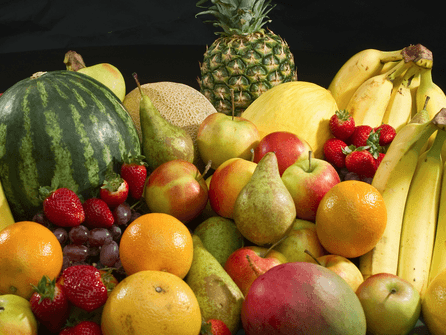People who eat fruit as part of an overall healthy diet generally have a reduced risk of chronic diseases. USDA’s MyPlate encourages making half your plate fruits and vegetables for healthy eating.Fruits are important sources of many nutrients, including potassium, fiber, vitamin C and folate (folic acid).
Below are some health benefits of eating fruits like Mango,Avocado and Watermelon.

Research has shown antioxidant compounds in mango fruit which protect against colon, breast, leukemia and prostate cancers.
- Lowers Cholesterol levels: The high levels of fiber, pectin and vitamin C help to lower serum cholesterol levels, specifically Low-Density Lipoprotein (the bad stuff).
- Clears the Skin: Mangoes Can be used both internally and externally for the skin and helps clear clogged pores and eliminate pimples.
- A cup of sliced mangoes supplies 25 percent of the needed daily value of vitamin A, which promotes good eyesight and prevents night blindness and dry eyes.
- The tartaric acid, malic acid, and a trace of citric acid found in the fruit help to maintain the alkali reserve of the body
- Mango leaves help normalize insulin levels in the blood. The traditional home remedy involves boiling leaves in water, soaking through the night and then consuming in the morning. Mango fruit also has a relatively low glycemic index so moderate quantities will not spike your sugar levels.
- Promotes Healthy Sex: Mangoes are a great source of vitamin E. even though the popular connection between sex drive and vitamin E was originally created by a mistaken generalization on rat studies, further research has shown balanced proper amounts does help.
- Improves Digestion. Papayas are not the only fruit that contain enzymes for breaking down protein. There are several fruits, including mangoes, which have this healthful quality. The fiber in mangoes also helps digestion and elimination.
- Helps Fight Heart Stroke: Juicing the fruit from green mango and mixing with water and a sweetener helps to cool down the body and prevent harm from overheating. .
- Boosts the Immune System: The generous amounts of vitamin C and vitamin A in mangos, plus 25 different kinds of carotenoids keep your immune system healthy and strong.
Avocados

Avocados are rich in vitamins and minerals, they are a great source of vitamins C, E, K, and B-6, as well as riboflavin, niacin, folate, pantothenic acid, magnesium, and potassium. They also provide lutein, beta-carotene, and omega-3 fatty acids.
Although most of the calories in an avocado come from fat, don’t shy away! Avocados are full of healthy, beneficial fats that help to keep you full and satiated. When you consume fat, your brain receives a signal to turn off your appetite. Eating fat slows the breakdown of carbohydrates, which helps to keep sugar levels in the blood stable.
1.Fat is essential for every single cell in the body. Eating healthy fats supports skin health, enhances the absorption of fat-soluble vitamins, minerals, and other nutrients, and may even help boost the immune system.
2.Healthy for the heart: Avocados contain 25 milligrams per ounce of a natural plant sterol called beta-sitosterol. Regular consumption of beta-sitosterol and other plant sterols has been seen to help maintain healthy cholesterol levels.
3. Great for vision: Avocados contain lutein and zeaxanthin, two phytochemicals that are especially concentrated in the tissues in the eyes where they provide antioxidant protection to help minimize damage, including from ultraviolet light.
4.Osteoporosis prevention; Vitamin K is essential for bone health: Half of an avocado provides approximately 25 percent of the daily recommended intake of vitamin K.This nutrient is often overlooked, but is essential for bone health.
5.Cancer: Adequate intake of folate(folic acid) from food has shown promise in protecting against colon, stomach, pancreatic, and cervical cancers.Avocados may even have a role to play in cancer treatment, with some research finding that phytochemicals extracted from avocado can selectively inhibit the growth of precancerous and cancerous cells and cause the death of cancer cells, while encouraging the proliferation of immune system cells called lymphocytes.
6.Healthy babies:Folate also known as folic acid is extremely important for a healthy pregnancy. Adequate intake reduces the risk of miscarriage and neural tube defects.
7.Lower risk of depression:Foods containing high levels of folate may help to decrease the risk of depression because folate helps to prevent the build-up of homocysteine, a substance that can impair circulation and delivery of nutrients to the brain. Excess homocysteine can also interfere with the production of serotonin, dopamine, and norepinephrine, which regulate mood, sleep, and appetite.
8.Improved digestion: Despite its creamy texture, an avocado is actually high in fiber with approximately 6-7 grams per half fruit. Eating foods with natural fiber can help prevent constipation, maintain a healthy digestive tract, and lower the risk of colon cancer.
9.Natural detoxification: Adequate fiber promotes regular bowel movements, which are crucial for the daily excretion of toxins through the bile and stool.Recent studies have shown that dietary fiber may also play a role in regulating the immune system and inflammation.
10.Protection from chronic disease: According to the Department of Internal Medicine and Nutritional Sciences Program of the University of Kentucky, high fiber intakes are associated with significantly lower risks of developing coronary heart disease, stroke, hypertension, diabetes, obesity, and certain gastrointestinal diseases. Increased fiber intake has also been shown to lower blood pressure and cholesterol levels, improve insulin sensitivity, and enhance weight loss for obese individuals.
 Water Melon
Water Melon
- Watermelon is an excellent source of beta-carotene, which the body turns into vitamin A. Eating watermelon can provide you with the Vitamin A that you need to keep your eyes healthy and help to ward off macular degeneration, as you get older.
- It hydrates your body. A study conducted at University of Aberdeen Medical School found that watermelon can hydrate your body, even better than pure water. This is due to the fact that it also contains rehydration substances, such as calcium, magnesium and potassium that improve the initial hydration and reduce the chance of dehydrating again later on.
- Helps to fight cancer. Watermelon is one of the best natural sources of the antioxidant, lycopene, which has been linked to the prevention and the treatment of certain types of cancer. It also contains Vitamin C, which is also an antioxidant.
- It can help regulate blood pressure. The magnesium, potassium and amino acids that are found in watermelon can help to regulate and even reduce blood pressure. In a study conducted by one of American Universities, researchers found that regular consumption of fresh watermelon can significantly reduce blood pressure.
- It boosts your energy levels. The next time that you are feeling a bit sluggish, try to eat a big slice of watermelon to give you some extra energy boost. Eating watermelon regularly has been shown to efficiently increase energy levels by a whopping 20% due to both its rehydrating properties and its vitamin B6 and B1 content, which the body uses to create the feel good hormone, dopamine.
- It helps keep your kidneys healthy. Watermelon contains a natural diuretic, which efficiently helps your body to get rid of toxins and stimulates the functioning of the kidneys. It can also help to reduce swelling in the kidneys and reduce the risk of kidney stones.
- Improves the immune system. Strengthened immune system is another one of health benefits of watermelon. The very high Vitamin C content of watermelon helps to boost your immune system and also helps in the formation of collagen, which is essential for the formation of new, beautiful skin. This means that watermelon can help you fight off infections and it can also help wounds to heal too.
- It can improve your mind. The Vitamin B6, found in watermelon, is an essential nutrient used in the brain to create certain types of neurotransmitters. Eating watermelon can also have a beneficial calming effect on your mood and it is also said to actually improve the functioning of your brain.
- It can help to fight the ageing process. Anti-ageing is another one of wonderful health benefits of watermelon. Although watermelon has very few calories, it is a rich source of phenolic compounds like flavonoids, carotenoids and tripterpenoids, which efficiently help protect against cell damage caused by free radicals, which can be the cause of the signs of ageing in the skin.
- It can help with weight loss. Watermelon makes the perfect snack for when you are losing weight. It’s nutritious and filling, but, because of its high water content and virtually no calories, it is a refreshing, sweet tasting snack that won’t wreck your weight loss plan.
Source:Ghana/StarrFMonline.com/103.5FM/ Files from The Guardian




